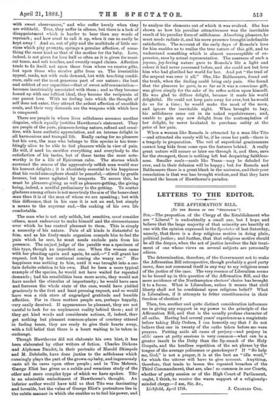LETTERS TO THE EDITOR.
THE AFFIRMATION BILL.
LTO THE EDITOR OF THE "SPECTATOR."] SIR,—The proportion of the Clergy of the Establishment who are " Liberal " is undoubtedly a small one, but I hope and
believe that the large majority of that minority are heartily at
one with the opinion expressed in the Spectator of last Saturday, namely, that there is a deep religious motive in doing plain,
political justice ; and further, that that religious motive should be all the deeper, when the act of justice involves the fair treatment of one whose views on several subjects are personally odious.
The determination, therefore, of the Government not to make the Affirmation Bill retrospective, though probably a good party move, does not commend itself in any way to my religious sense of the justice of the case. The very essence of Liberalism seems to be bound up in this question of the Affirmation Bill, and the mere accidence of the Northampton electors' choice has brought it to a focus. What is Liberalism, unless it means that civil liberty shall not be conditional upon religious belief? What is Liberalism, if it attempts to fetter constituencies in their freedom of election ?
Then, too, another and quite distinct consideration influences me in giving any support in my power to the principle of the Affirmation Bill, and that is the usually profane character of all oaths. Having had several years' experience as a magistrate before taking Holy Orders, I can honestly say that I do not believe that one in twenty of the oaths taken before me were prayers. Putting aside all cases of perjury—and perjury in. alibi cases at petty sessions is very common—what can be a greater insult to the Deity than the lip-smack of the Holy Gospels, and the heedless repetition of the set phrase by the tongue of the average policeman or gamekeeper? If "So help me, God," is not a prayer, it is at the best an "idle word," for which the utterer will have to give account. Anything, therefore, that tends to lessen the repeated breaches of the Third Commandment, that are, alas ! so common in our Courts, whether of petty session or of the High Court of Parliament, ought, I think, to receive the warm support of a religiously. minded clergy.—I am, Sir, &c., Lichfield, April 17th. J. CHARLES COX.


































 Previous page
Previous page